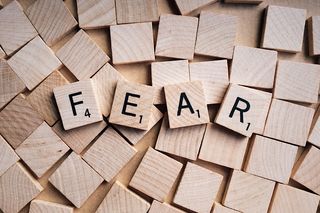Anxiety
Help for Anxiety: Facing Your Fears Will Heal Your Brain
If you avoid things that cause anxiety, you teach your brain to be more afraid.
Posted August 27, 2018 Reviewed by Kaja Perina

Do you tend to be fearful or anxious? It’s really important to know this about yourself, and deal with it appropriately.
Fear and anxiety are like kidnappers that hold you captive, holding you back from the full, free life you could be living. The stranglehold on your life will typically get worse over time, if left unchecked.
The good news is that there are simple things you can do to face your fears, and actually rewire your brain.
You can become a much less anxious person. It’s key to understand how your brain reacts to the things that frighten you, and how to change your habitual behaviors to help your brain be less anxious. I’ve written about other ways to heal anxiety in the past, but today we’ll focus on avoidance and exposure.
Don’t Be a Victim of Fearing Fear Itself
When it comes down to it, anxious people fear the feeling of fear. That’s the most scary part – the way you feel when something makes you really anxious. This leads to avoidance, which then leads to more avoidance, which leads to a progressively smaller, more limited life.
I know this well, because I tend to be anxious. I’ve learned to manage it better, but I'm that person who prefers to avoid scary things (heights, certain situations, certain risks). I have recently decided to stop avoiding, as much as I possibly can.
Avoidance is a bad strategy for your brain’s fear center. When you feel fear and run away or avoid, you miss the chance to “habituate” your amygdala (fear center) to the thing you’re afraid of.
You can teach your amygdala that it doesn’t need to be afraid of something, much as you might reassure a child who is convinced there are monsters under the bed. That terrified child might not believe you if you just tell them: “You shouldn’t be scared, there is nothing there”.
If you prove it to them instead, using their own positive experience, they’ll be much more likely to change their belief and let go of that fear entirely.
There aren’t monsters under the bed. And most of the things we are afraid of will never happen. Most of the things we fear aren’t likely to ever hurt us. What will hurt us, is living an ever-smaller life because we think we can’t handle things in it.
How Facing Your Fears Calms Down Your Brain
I don’t like glass elevators. The other day I had to take one, so I stuck it out, breathed and got through. I took the same elevator again a few days later and hardly thought of it, it got easier each time.
Why? How did this change?
My amygdala learned with experience that this wasn’t actually a threat.
I learned that I could handle it, too.
It changes your brain’s physiology to face your fears, especially in doses you can handle without getting completely overwhelmed (this glass elevator didn’t go up that high, so it was manageable, but I still didn’t want to be in it, at first).
Avoiding Things Teaches Your Brain to be More Afraid
If I had chickened out, I would have taught my brain that fear and avoidance is the right reaction to this “threat”, and it would have been worse the next time. Phobia experts know this to be true.
I’ve used a really simple situation, but this concept applies to all kinds of situations. I’ve gotten much less afraid of difficult conversations. I used to try to avoid them as a rule, but that just made them scarier and made me have even less confidence in my ability to handle them with success.
I have a great mentor who forces me to stay in the game when I want to run, and it has completely changed my perception, confidence and anxieties in this area.
Face your fears whenever you can. Notice the powerful urge to avoid, and don’t give in to it.
In most situations, it is worse for you and your life to avoid what you are afraid of instead of facing it.
Taking those small, positive, steady steps to banish your fear will do wonders to calm down your brain and your life.
Copyright Dr. Susan Biali Haas 2018




